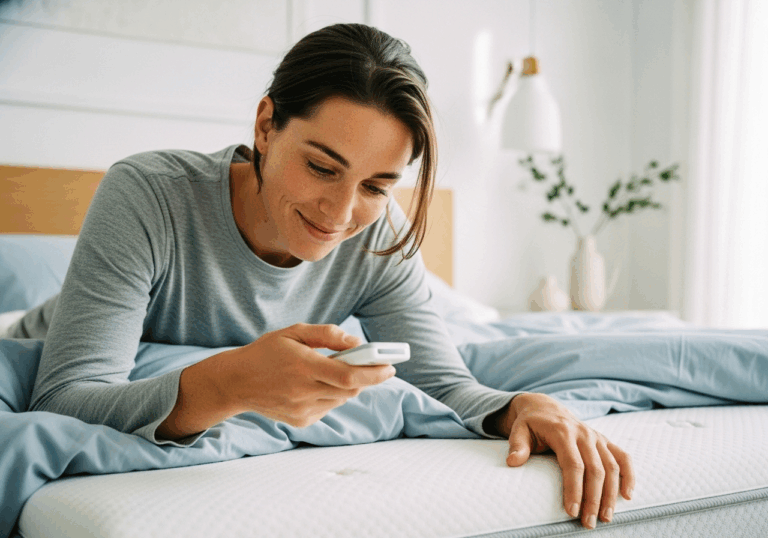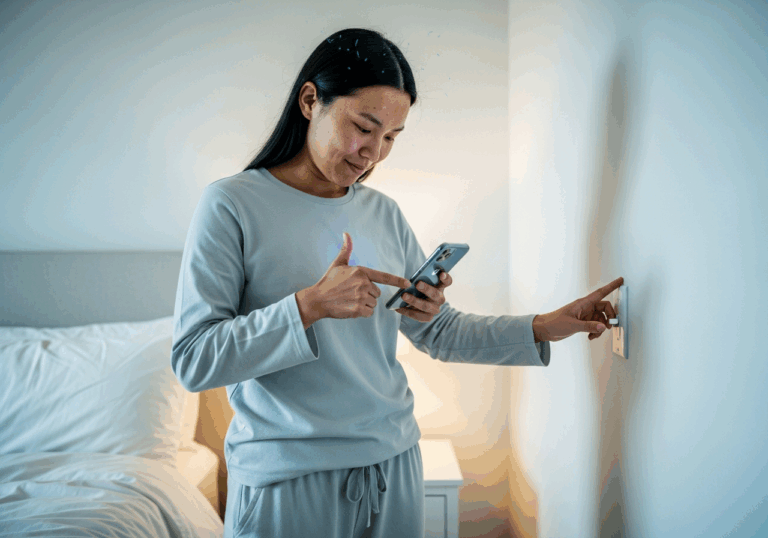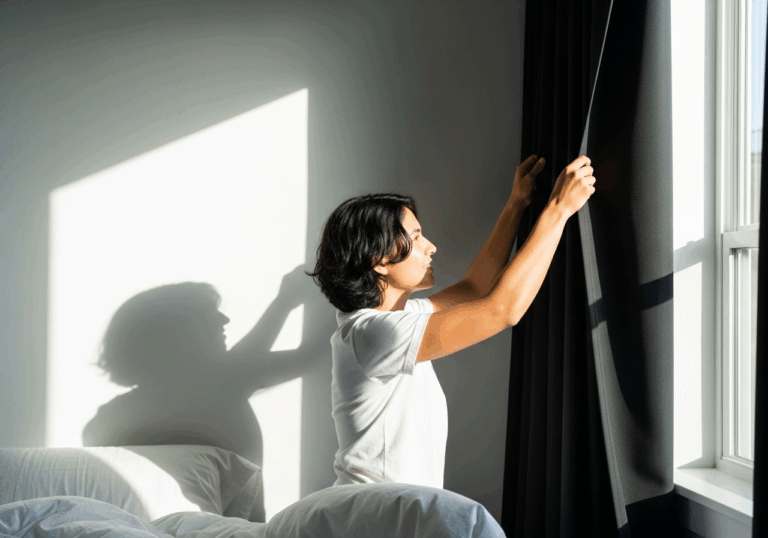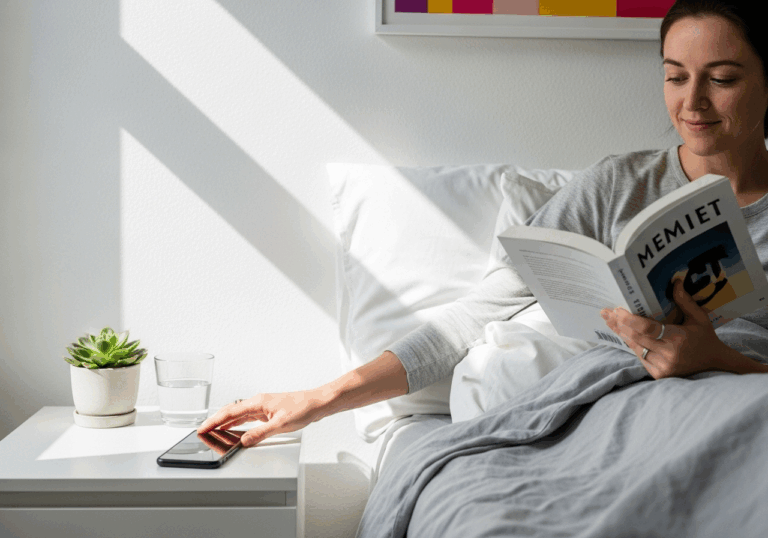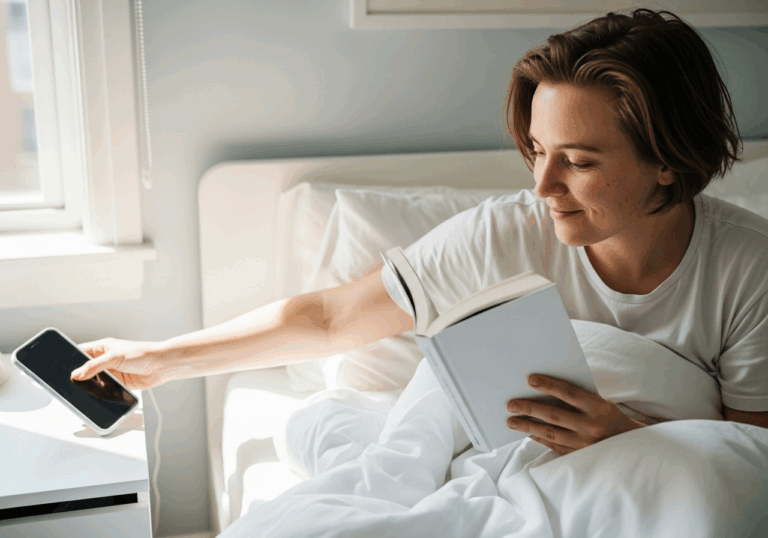Science-Backed Tips
Enhance Sleep with Blue Light Filters
Reduce melatonin suppression by 10% for better sleep quality.
📊 Did you know?
💡 Why It Matters
1️⃣
Improving sleep efficiency by 10% can lead to enhanced daytime alertness and productivity.
2️⃣
Reduced melatonin suppression supports better mood regulation, potentially decreasing anxiety levels.
3️⃣
Managing light exposure can improve overall sleep quality, contributing to long-term health benefits.
✅ Try These Micro-Tips
🎯
Use blue-light filters on devices for at least 1 hour before bedtime.
🎯
Consider wearing blue-light blocking glasses during evening screen time.
🎯
Limit screen time to 30 minutes before sleep to enhance melatonin production.
🎯
Create a calming bedtime routine that includes dimming lights and reducing device usage.
📚 The study
The study focused on the use of blue-blocking glasses and filters, revealing consistent improvements in sleep efficiency of approximately 10% across various studies.
This enhancement in sleep quality is crucial, as it not only leads to shorter sleep latency but also plays a significant role in mood regulation.
By managing light exposure, individuals can experience a smoother transition into sleep, which buffers mood and reduces anxiety levels.
The implications of these findings are profound; improving sleep efficiency can boost daytime alertness and productivity, ultimately contributing to long-term health benefits.
As we continue to navigate a world filled with screens and artificial lighting, adopting simple strategies like using blue-light filters or enabling ‘night mode’ on devices can make a significant difference in our overall well-being.
Prioritizing sleep is essential, and with these interventions, we can take proactive steps towards achieving better sleep quality and enhancing our daily lives.
❓ Frequently Asked Questions ❓
Learn more
What are blue-light filters and how do they work?
Blue-light filters are tools or settings on devices that reduce the amount of blue light emitted from screens. They work by altering the color temperature of the display, making it warmer and less harsh on the eyes, especially in the evening.
How does blue light affect sleep?
Blue light exposure in the evening can suppress melatonin production, which is crucial for regulating sleep. Reducing blue light exposure before bed can improve sleep efficiency and overall sleep quality.
What is melatonin and why is it important?
Melatonin is a hormone that regulates sleep-wake cycles and promotes restful sleep. Adequate melatonin levels are essential for mood regulation and overall health.
How much can blue-light filters improve sleep efficiency?
Using blue-light filters can improve sleep efficiency by approximately 10%. This enhancement can lead to better daytime alertness and productivity.
What are some effective ways to manage light exposure before bed?
Effective ways to manage light exposure include using blue-light filters on devices, wearing blue-light blocking glasses, and limiting screen time before sleep. Additionally, creating a calming bedtime routine with dim lighting can further enhance sleep quality.
How long before bed should I use blue-light filters?
It is recommended to use blue-light filters on devices for at least 1 hour before bedtime. This practice helps reduce melatonin suppression and supports a smoother transition to sleep.
Can reducing blue light exposure decrease anxiety levels?
Yes, reducing blue light exposure can support better mood regulation, potentially decreasing anxiety levels. Improved sleep quality from reduced melatonin suppression contributes to overall mental well-being.
What is the recommended screen time limit before sleep?
Limiting screen time to 30 minutes before sleep is recommended to enhance melatonin production. This helps facilitate a more restful sleep experience.
What role does a calming bedtime routine play in sleep quality?
A calming bedtime routine, which includes dimming lights and reducing device usage, plays a significant role in improving sleep quality. It helps signal to the body that it’s time to wind down and prepare for sleep.
Are there long-term health benefits to managing light exposure?
Yes, managing light exposure can improve overall sleep quality, which contributes to long-term health benefits. Better sleep is linked to enhanced mood, reduced anxiety, and improved cognitive function.

